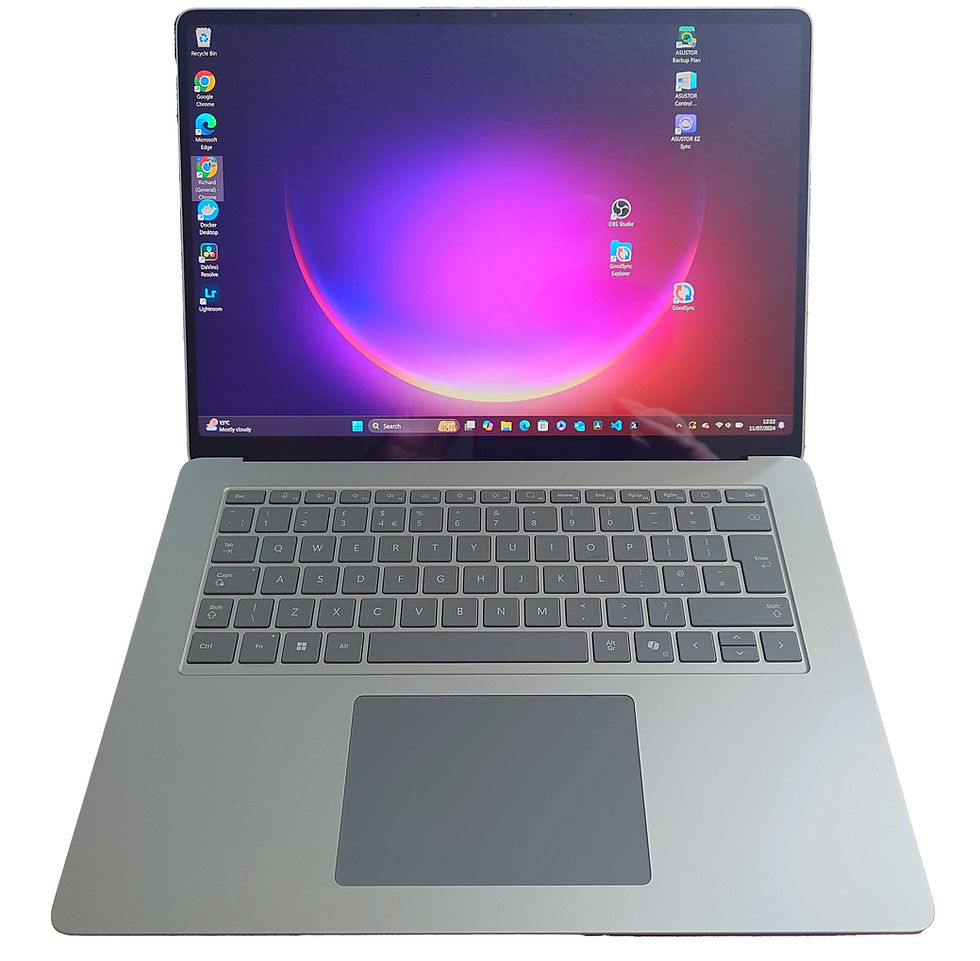I am not a PC reviewer, obviously, but I needed to change from my hungry 130W Dell XPS17 to something less hungry on power if I am to live in a campervan. This should be possible with the new low-power ARM chips being released now by vendors. I thought it might be useful to others who may be looking for a similar option. This review is my take on the new Microsoft Surface Laptop 7 and how things are working out.

Laptop Power Usage
One of the most important things is low power usage and being able to use it on 12V DC rather than having an inefficient DC to AC inverter on for several hours every day. Firstly, why an ARM-based laptop, simple, low power usage? Power is everything in a campervan and I don't want to use a 130W laptop for 8 hours daily on an inverter. This isn't the first attempt at an ARM chip-based laptop from Microsoft, they have tried a couple of times unsuccessfully, but it does appear Microsoft have at last cracked it with the new Qualcomm chips. New ARM-based laptops allow them to be run via USB C Power Delivery (PD). This makes a big difference in a van. With 65W PD sockets in the van, this makes it easy to use/charge low-power laptops.
The Surface Laptop 7 will run on the included Power Supply Unit (PSU), which outputs max 60W or via USB C Power Delivery (PD) 60W. Not sure which PD standard but assume it's PD3 15V @ 4A maximum. A regular 60W PD cable is all you need to power this now if you don't want to use the supplied charger which comes with the laptop. It also has a second Thunderbolt 4, USBC PD (DisplayPort 2.1) delivery port to connect and power an external monitor. This means I can use the laptop on its own and also with an external monitor all via DC.
Monitors powered by PD tend to be small and low quality, so I purchased the Thunderbolt 4 dock so that I could connect a larger monitor that uses regular AC power. The docking station uses 22V @ 7.4A max, so I have purchased a 12 to 22V 10A converter to allow this to be permanently hard-wired into the DC system. I like to have as much hard-wired as possible from the DC circuit. This setup means the AC inverter is only needed when I want to use the large monitor.
Upgrades & Maintainability
I purchased the 15", 16GB memory, 256GB SSD version of the laptop for £1349, knowing I would upgrade the SSD. This is way cheaper than purchasing the Microsoft larger 1TB SSD version. I purchased a separate 2TB Western Digital black M.2 SSD and switched it over. Everything worked fine. I just put the new SSD in a suitable enclosure and used GeniusPC to clone the C: drive.
Like a few others, Microsoft has now put a lot of work into making their laptops more maintainable by technicians and even owners. This is a trend started by Framework, but now many companies are jumping on the train. The back is super easy to remove and everything is clearly labelled inside. Even which torque screw size to use, is noted inside. It is very easy to replace the SSD, battery, audio jack, speakers and many other components.
This is very encouraging that vendors are now designing with self-maintenance in mind and the Service Guide documentation is also very good.
Software Compatibility
I use my laptop mainly for development, productivity, content creation and maybe some light gaming. I don't use it for heavy gaming so a big dedicated graphics card is unnecessary. Windows 11 ARM uses a PRISM emulator behind the scenes to run 32 and 64-bit regular x86 software. This generally does a good job most of the time, but it does not work for everything.
Development
Git for Windows - Works well
Visual Studio Code (ARM) - Native ARM edition available
Azure Data Studio (ARM) - Native ARM edition available
Python for Windows (ARM) - Native ARM edition available
Powershell Core (ARM) - Native ARM edition available
Docker for Windows - Works well
Node.js / React / Typescript - Works well
WSL - Works well
Productivity
Google Chrome - Works well
Office - Works well
OBS - Works well
Goodsynch - Works well
Asustor NAS software products - Works well
Content Creation
Adobe Lightroom (ARM) - Native ARM edition available
Adobe Photoshop (ARM) - Native ARM edition available
Adobe Lightroom Classic - Does not work. This is the main downside for me, I have to keep a traditional x86 system until an ARM edition is released. My photography collection is important and traditional Lightroom doesn't have the cataloguing features Classis does.
Davinci Resolve (ARM) - public beta 4 of Resolve 19 is available and seems to work well for a beta.
Insta 360X Studio - Does not work. The emulator doesn't work and an ARM edition does not exist.
Conclusion
I am pleasantly surprised by the new Surface Laptop 7. It seems a good balance between cost, power, battery life and features. It is not perfect but with the greater adoption of Windows ARM continuing, things can only get better. I think finally the 7th edition is the one most likely to go mainstream for Microsoft. I have not used the Mac M series ARM laptops, but from the reviews I have seen, this Surface laptop seems to be finally starting to compete with Mac.
As I discover more, I will add to this post. Once the van IT setup is complete, I will post separately on the entire IT setup in the van.
Comments